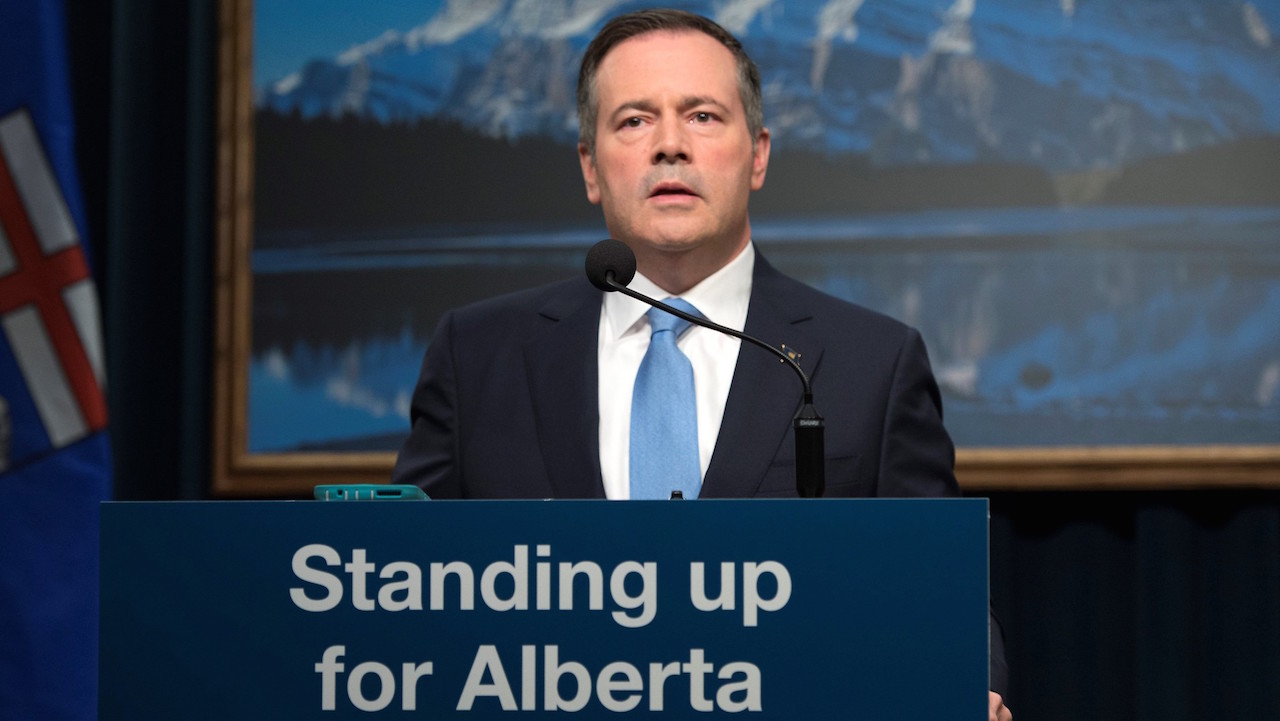With the exception of Donald Trump’s claim that he’s draining the swamp, it’s hard to imagine a clearer example of gibberish than Jason Kenney’s claim that he’s defending Alberta against “foreign-funded special interests.”
The Alberta premier has launched a public inquiry to expose the foreign funding behind environmental groups opposing his efforts to increase production of Alberta’s carbon-heavy oil.
But Kenney’s claim to be shielding Albertans from foreign “special interests” is absurdly selective; he’s planning to shine the light on a small slice of foreign influence, while keeping the spotlight away from the massive foreign influence exerted by Big Oil.
If there’s ever been a foreign player wielding influence in Canada, it’s been Big Oil, which has exercised a virtual stranglehold over Alberta politics during the last few decades. But that story — and Kenney’s complicity in it — is one the premier is determined to keep under wraps.
“Big Oil was the original special interest meddling in Canadian affairs,” says Donald Gutstein, an adjunct professor at Simon Fraser University and author of The Big Stall: How Big Oil and the Think Tanks are Blocking Action on Climate Change. “From the very beginning, Canada’s oil and the tarsands were an American affair, financed by American capital to provide petroleum for the American market. Canadians and the environment be damned. Now Canadians, environmentalists and First Nations are saying ‘enough.'”
Let’s be clear: enormous amounts of money are being spent in the global battle to lobby governments and sway public opinion on climate change in the roughly dozen years we have left — according to the UN’s panel of climate experts — before it’s too late to stop the world’s descent into climate hell.
But the vast majority of this money — by a margin of about 10 to 1 — is spent by the fossil fuel industry, according to research by Drexel University’s Robert Brulle.
What is truly absurd is the notion that the relatively small amounts of foreign money coming from the Rockefeller and Tides foundations are any match for the huge resources unleashed by corporations and wealthy individuals to defend their investments in fossil fuels.
Some of the most powerful U.S. oil interests — including the multi-billionaire Koch brothers — have major holdings in Alberta, as the Star’s Olivia Ward and the Washington Post have documented.
The Kochs have been leading funders of the climate denial movement in the U.S., and a potent force shaping conservative politics.
While foreign interests stay out of the Canadian limelight, allowing Canadian oil advocates to speak for them, their reach into Canadian politics is astonishingly deep and comprehensive, according to Kevin Taft, who served as leader of the opposition in the Alberta legislature from 2004 to 2008.
Former Alberta premier Peter Lougheed attempted in the 1970s and ’80s to limit the power of foreign oil interests and to direct a larger share of oil profits to the people of Alberta, but his successors — particularly Ralph Klein and Jason Kenney — have largely capitulated to Big Oil.
“Jason Kenny is an instrument of the oil industry, full stop,” says Taft, whose book, Oil’s Deep State, describes the extraordinary grip Big Oil has on Alberta (and Canadian) politics. “The biggest oil companies in Canada all depend on foreign investors, and most are majority owned by U.S., Chinese, and European interests. These people are smart, ruthless, and greedy, and their number one concern is corporate profit. They’ve captured political parties, regulators, and civil servants.”
Ironically, environmental groups tend to be upfront about their foreign donations. The Pembina Institute, one of Kenney’s targets, declares on its website that 15 per cent of its funding is foreign.
Meanwhile, according to Brulle’s research, the climate denial movement is quietly funded by Big Oil and conservative billionaires, who funnel enormous resources through secretive networks of charities that don’t disclose funding sources.
Yet it is environmental groups that Kenney wants to harass and hold up to ridicule.
As the debate over climate change intensifies, Kenney’s refusal to shine the spotlight on the real foreign meddlers grows ever more absurd — like investigating the type of weapons used in recent mass killings, but refusing to consider guns.
Linda McQuaig is a journalist and author. Her book Shooting the Hippo: Death by Deficit and Other Canadian Myths was among the books selected by the Literary Review of Canada as the “25 most influential Canadian books of the past 25 years.” This column originally appeared in the Toronto Star.
Photo: Government of Alberta/Flickr



